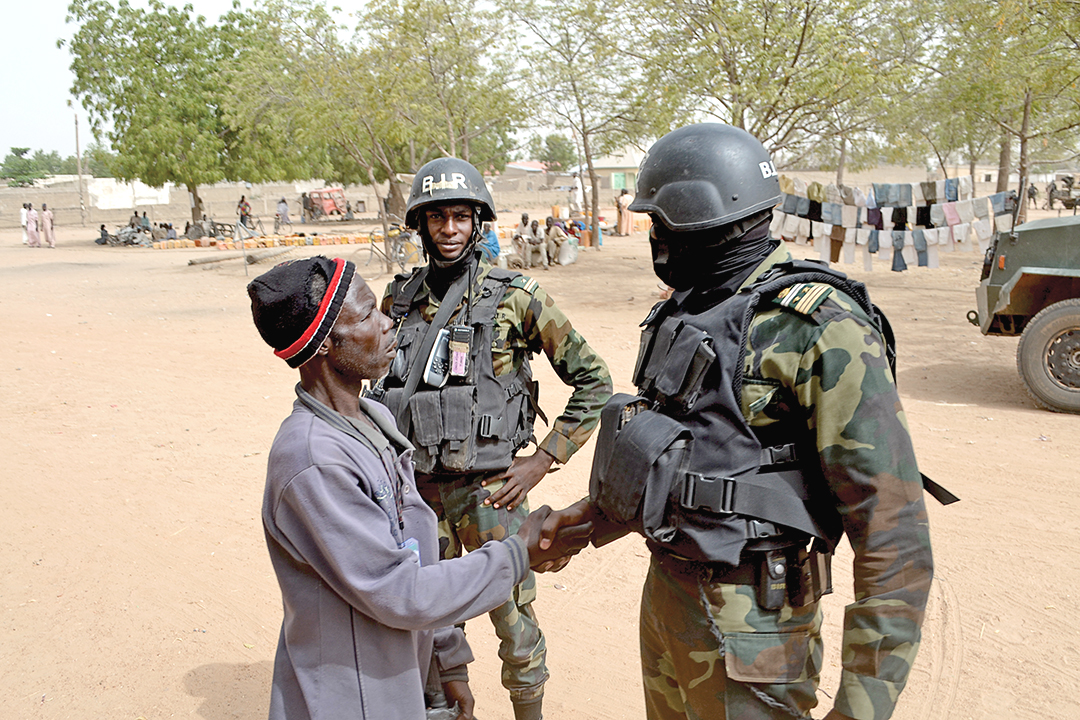On the Lookout
Vigilante groups offer short-term security, but northern Cameroon needs long-term development
ADF STAFF
When a female suicide bomber came to Mora, Cameroon, and refused to stop at a checkpoint, it looked like another gruesome attack was about to occur in a region that has grown used to carnage.
Then something unusual happened. A civilian who is part of a self-defense group in the town shot an arrow with a poison tip at the attacker. The shot killed the woman as a second suicide bomber detonated her vest, but the blast killed only the terrorist. The armed citizen’s quick action likely saved dozens of lives.
Vigilantes and self-defense groups are proliferating in northern Cameroon and northern Nigeria as civilians look for ways to defend their communities from Boko Haram insurgents and other threats. Some are paid, but most are volunteers. Some receive basic military training, and their equipment ranges from semiautomatic weapons to bows and arrows or even farm implements. The Cameroonian government is distributing equipment including rifles, flashlights and night-vision goggles to the groups. It is also working with village elders to ensure the best candidates are selected to join the groups.
Cameroonian President Paul Biya has endorsed the practice, calling the armed citizens “models for the nation.”
Lt. Gen. Rene Claude Meka, head of Cameroon’s Army Command Staff, said they are part of a long Cameroonian tradition of “popular defense.” “In effect, the Cameroonian people rose up as one man against the barbarity,” Meka said. “This has allowed us to obtain the positive results that we have today.”
Vigilantes have been valuable to security forces who count on them to pass along intelligence and, in effect, serve as their eyes and ears in remote parts of the country. “They work with the Army and give them information,” said Col. Didier Badjeck, spokesman for the Cameroonian Armed Forces. “They will say, ‘Attention, there is a foreigner that we don’t know,’ and that permits us to limit, enormously, the consequences of these suicide attacks.” This work has also put them at risk as Boko Haram has begun exacting revenge. In July 2016, Boko Haram members snuck into the village Cherif Moussari at night and slit the throat of the head of the village self-defense group only hours after he had been appointed.
The connection between civil society and security runs deeper than just the few who volunteer to stand guard. Observers say true security will require additional development in Cameroon’s north and new job opportunities for the young men who are Boko Haram’s prime recruiting targets.
“The majority of people recruited by Boko Haram are recruited through socio-economic incentives,” said Hans De Marie Heungoup, a Cameroonian security expert and analyst with the International Crisis Group. “They offer them motorbikes or this loan or a salary for three or six months.”
Guibai Gataba, founder of L’oeil du Sahel, a newspaper that covers security issues in the region, said the north, the area most densely populated in Cameroon, may need its own Marshall Plan after years of disruption due to the Boko Haram threat and other pressures. The average age of Boko Haram adherents is 23, with many joining during childhood and growing up in the group. “You have a zone in despair, a zone overpopulated with no education, no hope, no work,” he said. “This is easy prey for Boko Haram.”
There is no simple fix for this problem. The Cameroonian government has approved $10 million to fund an emergency development and recovery plan for the north. The estimated cost to meet regional needs, however, is closer to $1 billion, Heungoup said. Military engineers are pitching in with civil road and bridge construction projects, including an anticipated road project in Maroua that should help commercial activity.
All agree that the needs are daunting for the 4 million people who live in the region, 70 percent of whom live in poverty. In an essay published in the Cameroonian military magazine Honneur et Fidelité, Vincent Ntuda Ebodé of the University of Yaoundé Il-Soa argues that defense forces and civil society actors need to work together to fight Boko Haram’s long-term influence. “It’s not only about putting an end to the conflict,” Ebodé wrote. “It’s more about setting up a durable peace. That’s why next to military initiatives there are civil initiatives. Furthermore, civilians offer the major and multiform support needed for the final victory.”


Comments are closed.